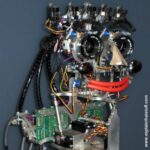AI is not likely to replace engineers entirely. Instead, it is expected that AI will complement and augment the skills of engineers, transforming the nature of their work and requiring them to acquire new competencies.
Key Takeaways
- AI is a tool that can enhance the capabilities and productivity of engineers.
- AI is unlikely to completely replace engineers, as it lacks human creativity, intuition, and problem-solving skills.
- Engineers will need to acquire new competencies to work effectively with AI.
- AI can automate routine tasks and provide valuable insights and recommendations to engineers.
- The role of engineers will evolve from traditional execution to collaboration with AI tools and technologies.
The Role of AI in Engineering

Understanding AI and its Impact on Engineering
The rise of AI in engineering has sparked debates and discussions about the future of engineers and whether they will be replaced by AI technologies. One of the key concerns surrounding the rise of AI in engineering is the potential threat it poses to traditional engineering jobs. AI is capable of performing complex tasks, analyzing vast amounts of data, and learning from patterns and trends in ways that were previously unimaginable. This has led to advancements in technology, and the role of AI in various industries, including engineering, has become more prominent. However, it is important to understand that AI is not a substitute for engineers but rather a tool that can enhance their capabilities and productivity. Engineers have always relied on data analysis, problem-solving, and decision-making in their work. AI has the potential to complement these skills by providing valuable insights and assistance in the increasing influence of AI in engineering, its impact on traditional engineering jobs, the evolving skills necessary for future engineers, AI’s role in design and development, the automation of routine engineering tasks, the shift towards collaborative engineering, and the importance of reskilling engineers for the AI era.
AI Applications in Engineering
AI algorithms can analyze large amounts of data and provide valuable insights for engineers. For instance, AI-powered simulations and modeling can optimize product designs, identify potential flaws, and propose improvements. This streamlines the design process, enhances efficiency, and reduces production costs. Additionally, AI can automate tedious and repetitive tasks, allowing engineers to focus on more complex and creative aspects of their work. It is important to address the concerns about AI replacing traditional engineering jobs. While AI has the potential to automate routine tasks, it is unlikely to completely replace engineers. Instead, AI can augment their abilities and free up more time for higher-level problem-solving and innovation.
Benefits of AI in Engineering
AI algorithms can analyze large amounts of data and provide valuable insights for engineers. For instance, AI-powered simulations and modeling can optimize product designs, identify potential flaws, and propose improvements. This streamlines the design process, enhances efficiency, and reduces production costs. Additionally, AI can automate tedious and repetitive tasks, allowing engineers to focus on more complex and creative aspects of their work.
It is important to address the concerns about AI replacing traditional engineering jobs. While AI has the potential to automate routine tasks, it is unlikely to completely replace engineers. Instead, AI can augment their abilities and free up more time for higher-level tasks that require human ingenuity and creativity. By leveraging the capabilities of AI, engineers can focus on higher-level tasks that lead to advancements in innovation and problem-solving.
In the AI era, engineers will need to adapt their skills and embrace the opportunities that automation brings. This includes developing a deep understanding of AI technologies, learning how to collaborate effectively with AI systems, and continuously updating their knowledge and expertise. By doing so, engineers can thrive in a future where AI plays a significant role in engineering processes.
Benefits of AI in Engineering:
- Automation of routine tasks: AI can automate repetitive tasks, saving time and increasing productivity.
- Optimization of product designs: AI-powered simulations and modeling can optimize product designs, leading to improved efficiency and reduced production costs.
- Augmentation of engineer’s abilities: AI can augment engineer’s abilities and free up more time for higher-level tasks that require human ingenuity and creativity.
Concerns about AI replacing engineers:
- Job displacement: There are concerns that AI will replace human engineers, leading to job displacement. However, AI is more likely to augment engineer’s abilities rather than completely replace them.
- Need for skill adaptation: Engineers will need to adapt their skills and embrace the opportunities that automation brings in order to thrive in the AI era.
In conclusion, AI has significant benefits in engineering, including the automation of routine tasks, optimization of product designs, and augmentation of engineer’s abilities. However, it is important to address concerns about job displacement and the need for skill adaptation in the AI era.
Challenges and Limitations of AI in Engineering
Although AI has made great strides in software engineering, it still has limitations that prevent it from fully replacing software engineers. One of the main challenges lies in addressing complex problem-solving that extends beyond predetermined patterns. While AI excels in processing large amounts of data and recognizing patterns, it often struggles with abstract or novel situations that demand human reasoning and creativity.
Moreover, ethical considerations cannot be overlooked. AI systems, when not properly regulated and supervised, can exhibit unconscious biases and limitations. This can result in a lack of fresh perspectives and new ideas in the field, stifling innovation and hindering progress.
There is also the question of ethics and accountability in AI-powered engineering. While engineers are ultimately responsible for the systems they create, the complexity of AI can make it challenging to determine who is accountable for any issues or mistakes. This raises concerns about the potential for unethical or harmful applications of AI, as well as the need for regulations and guidelines to ensure responsible use.
In conclusion, AI has the potential to greatly enhance engineering processes, but it is important to recognize and address the challenges and limitations that come with its implementation.
The Future of Engineering with AI

AI’s Influence on Engineering Job Market
The rise of AI in engineering has sparked debates and discussions about the future of engineers and whether they will be replaced by AI technologies. One of the key concerns surrounding the rise of AI in engineering is the potential threat it poses to traditional engineering jobs. AI is capable of performing complex tasks, analyzing vast amounts of data, and learning from patterns and trends in ways that were previously unimaginable. This has led to the increasing influence of AI in engineering, its impact on traditional engineering jobs, the evolving skills necessary for future engineers, AI’s role in design and development, the automation of routine engineering tasks, the shift towards collaborative engineering, and the importance of reskilling engineers for the AI era.
Collaboration between Engineers and AI
Collaboration between engineers and AI is becoming increasingly important in the field of engineering. As technology continues to advance, engineers must adapt to this shift towards collaborative engineering. One of the key aspects of collaborative engineering is the integration of AI-powered tools and software into the design and development process. These tools enable real-time collaboration, quick iterations, and instant feedback, resulting in more efficient and innovative solutions. AI algorithms also automate routine engineering tasks, freeing up engineers’ time for more complex and creative work. This redefines the required skills for engineers, emphasizing the development of interpersonal skills such as communication and teamwork alongside technical expertise. Engineers must learn to effectively communicate with AI algorithms, understand their capabilities and limitations, and integrate their outputs into the overall design process. By embracing collaboration with AI, engineers can leverage its capabilities to enhance their work and drive advancements in the field of engineering.
Skills and Knowledge for Engineers in the AI Era
Some engineers may need to reskill or acquire additional knowledge to adapt to the changing demands of the AI era. AI can assist engineers in designing and optimizing systems, leading to improved efficiency and productivity. There may be job displacement in certain engineering sectors as AI technology continues to advance.
Evolving Skills For Future Engineers
As the world continues to advance in technology, the skills required for future engineers are also evolving. With the rise of artificial intelligence (AI) and automation, engineers now need to adapt and develop a new set of skills to thrive in the AI era.
- Adaptability: Engineers need to adapt to the changing technological landscape and continuously update their skills to work effectively with AI systems.
- Data Analysis: With the increasing reliance on AI in design and development, engineers must possess strong data analysis capabilities to interpret and utilize the insights provided by AI algorithms.
- Creativity: Despite AI’s ability to automate tasks, creativity remains a distinctly human trait. Engineers should focus on developing innovative and out-of-the-box solutions that complement AI-generated designs.
Ethical Considerations in AI-Driven Engineering
Ethical considerations play a crucial role in the development and deployment of AI-powered software in engineering. As AI technology becomes more advanced and integrated into various industries, it is important for software engineers to be aware of the potential ethical implications and challenges that may arise. One of the key considerations is the potential for unethical or harmful applications of AI, which highlights the need for regulations and guidelines to ensure responsible use. To address these ethical considerations, software engineers should receive proper education and training in AI ethics. They need to be equipped with the knowledge and skills to understand the ethical implications of AI-powered software and make informed decisions throughout the development process. Collaboration with domain experts and ethicists is also essential to ensure the development of ethical AI systems. Implementing transparency measures, such as
Conclusion
In conclusion, while there may be concerns about the impact of AI on the engineering profession, it is unlikely that AI will completely replace software engineers. AI is a powerful tool that can augment and assist engineers in their work, but it cannot replicate the creativity, problem-solving skills, and human judgment that engineers bring to the table. Instead of replacing engineers, AI will enable them to work more efficiently and effectively, suggesting solutions, providing automated code review, and assisting in project management. Engineers will continue to play a crucial role in developing and overseeing AI systems, utilizing their deep understanding of the field and innovative problem-solving abilities. As the field of software engineering evolves, engineers will need to adapt and acquire new competencies to effectively collaborate with AI systems and leverage their capabilities. The future of engineering lies in the collaboration between engineers and AI, where both can complement each other’s strengths and drive innovation in the field.
Frequently Asked Questions
Will AI replace software engineers?
While AI is capable of automating certain tasks, it is unlikely to completely replace software engineers. AI is a tool that can augment and assist engineers in their work, but it cannot replicate the creativity, problem-solving skills, and human judgment that engineers bring to the table. Instead of replacing engineers, AI will enable them to work more efficiently and effectively. It can suggest solutions, provide automated code review, and assist in project management.
Will software engineers be replaced by AI?
As AI-powered tools and frameworks become increasingly sophisticated, it’s natural to wonder what the future holds for those who specialize in building and maintaining software applications. However, the truth is that AI is not likely to replace engineers entirely. Instead, it is expected that AI will complement and augment the skills of engineers, transforming the nature of their work and requiring them to acquire new competencies. Human creativity and intuition are still invaluable in the engineering process, and engineers will continue to play a crucial role in developing and overseeing AI systems.
What is the role of AI in engineering?
AI plays a significant role in engineering by providing valuable insights, automating certain tasks, and enhancing the productivity of engineers. It can analyze large amounts of data, generate recommendations, and assist in design and development processes. However, it is important to understand that AI is not a substitute for engineers but rather a tool that can enhance their capabilities and productivity.
What are the benefits of AI in engineering?
AI offers several benefits in engineering, including increased efficiency, improved accuracy, enhanced problem-solving capabilities, and the ability to analyze and process large amounts of data. It can assist engineers in making informed decisions, suggest solutions, and automate routine tasks, freeing up more time for innovation and complex problem-solving.
What are the challenges and limitations of AI in engineering?
While AI has numerous benefits, it also faces challenges and limitations in the field of engineering. Some of these challenges include the need for high-quality and reliable data, the potential for bias in AI algorithms, the lack of human judgment and intuition in AI systems, and the ethical considerations surrounding the use of AI in engineering. Additionally, integrating AI into existing engineering processes and workflows may require significant changes and adaptations.
How will AI influence the engineering job market?
AI is expected to have a significant influence on the engineering job market. While certain routine tasks may become automated, the demand for engineers with skills in AI and machine learning is likely to increase. Engineers who can effectively collaborate with AI systems and utilize AI tools will be in high demand. However, it is important for engineers to adapt and acquire new competencies to stay relevant in the evolving job market.




